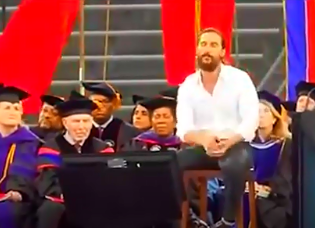So, before I share with you some what I do know, I want to talk with you about what I don't know.
在我同你们分享一些我知道的事情之前,我想先谈谈我不知道的事情。
Now, I have two older brothers. One was in high school in the early 1970s.
我有两个哥哥。一个哥哥在20世纪70年代初上高中。
This was a time when a high school GED got you a job and college degree was exemplary.
在那个年代,拥有高中同等学历就能找到工作,而拥有大学文凭就更是模范了。
My other brother, Pat, was in high school in the early 80s,
我的另一位哥哥派特,在20世纪80年代初上高中。
and by this time the GED wasn't enough to guarantee employment, you needed a college degree.
而到了那时,只有高中同等学历已经不能保证找到工作了,你需要大学文凭。

And if you got one, you had a pretty good chance of getting the kind of job that you wanted after you graduated.
如果你有大学文凭,毕业后就很有可能找到心仪的工作。
Now me, I graduated from high school in 1988, got my college degree in 1993.
现在轮到我了,我1988年高中毕业,1993年拿到大学文凭。
And that college degree in '93 did not mean as much.
然而在1993年,大学文凭已经不算什么了。
It was not a ticket, not a voucher, was not a free pass go to anything.
它不是门票,不是凭证,不是去任何地方的免费入场券。
So, I ask the question: what does your college degree mean?
所以我要问的问题是:你们的大学文凭意味着什么?
It means you got an education; it means you have more knowledge in a specific subject, vocation;
它意味着你们受过教育;意味着你们在某一具体学科、行业上具有更多的知识;
it means you may have more expertise in what your degree is in.
它意味着你们在获得学位的那个领域中拥有更多的专业知识。












